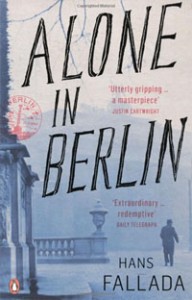Hans Fallada’s original text of his tragic war-time novel now available in a new edition
 A late victory lap through the literary world: 67 years after its initial publication, the novel “Every Man Dies Alone” by Hans Fallada has become an international bestseller. New translations offer readers in Great Britain, France, the US, and Israel – where more than 100,000 copies sold in a short time – a chance to immerse themselves in 1940’s Berlin. At that time fascism and war transformed the daily lives of a working-class couple into a drama of hardship, grief, and courage. As Hitler’s war devastates Europe, Otto and Anna Quangel wage a struggle all their own against the Nazis.
A late victory lap through the literary world: 67 years after its initial publication, the novel “Every Man Dies Alone” by Hans Fallada has become an international bestseller. New translations offer readers in Great Britain, France, the US, and Israel – where more than 100,000 copies sold in a short time – a chance to immerse themselves in 1940’s Berlin. At that time fascism and war transformed the daily lives of a working-class couple into a drama of hardship, grief, and courage. As Hitler’s war devastates Europe, Otto and Anna Quangel wage a struggle all their own against the Nazis.
“I truly wonder what I will do next. Because I will do something, that much I know. I just don’t know yet what it will be.” This is how Otto Quangel, the deeply reserved, laconic, and somewhat rough foreman of a former furniture shop now repurposed to build military shipping crates and coffins, resolves to resist the Nazi regime and spread the truth about the war. The reason? He and his wife Anna have just lost their only son in Russia.
In Berlin between 1940 and ’42, an ordinary husband and wife from Jablonskistrasse in the working-class Friedrichshain district of Berlin become heroes against their will in a clearly hopeless duel. Their only weapon is postcards left in the stairwells of other buildings on which Otto calls for resistance. Their campaign goes on for two years, but the risk of getting caught grows with each passing day. “It might be wise, Anna, to imagine a difficult death while we still enjoy a quiet life,” Quangel warns his wife. Sensing their fate, he tells her: “We will have to die alone, too, Anna.” “You can count on me, Otto,” she answers. “I won’t put you to shame.”
Numerous films have been made based on the novel, “Every Man Dies Alone,” which itself is largely based on the true story of the Hampels, a working-class Berlin couple executed in 1943. Hans Fallada, born Rudolf Ditzen (1893-1947) was the author of “Little Man, What Now?,” “Wolf among Wolves”, and “Who Once Eats Out of the Tin Bowl.”
He wrote this, his final work, just after the end of World War II at the suggestion of Johannes R. Becher, the communist poet from Munich who would go on to become the Minister of Culture for East Germany. By the time the book was published in 1947, Fallada was dead. Thus, the newly founded Aufbau Verlag was able to print the book without any objection from Fallada to cuts and changes made by the editor and approved by the publisher.
Today, Fallada’s great novel is finally available in its original length, with its original complexity, and with its original voice intact. The new edition matches the typescript of the novel in the publisher’s archives. The handwritten corrections and deletions in the typescript indicate that the publisher had a major influence on the first edition of the book.
Primarily, the changes were politically motivated, turning the Quangels and many other characters into heroes without flaws or weaknesses. That meant, for instance, that there was no mention of the National Socialist Women’s League, of which Anna was at first a proud member. Also excised from the book was letter-carrier Eva Kluge’s membership in the Nazi Party, an affiliation that initially bought her a measure of personal safety.
In Fallada’s typescript, these individuals developed gradually into courageous fighters in the course of the tale. Aufbau Verlag also whitewashed the ambivalence of the petty perpetrators whose misdeeds were as attributable to circumstance as to malice. In Fallada’s book, it was never clear what side the residents of Jablonskistrasse 55 were on. The motives of the gamblers and careerists, the thieves, commissars and party bosses, the spies, informers, and their victims that populate the story, were also depicted in their full human complexity.
It is rewarding to read this wonderful novel, to immerse one’s self in this difficult time that our parents and grandparents lived through, to experience Berlin during World War II. Primo Levi called “Every Man Dies Alone” the “greatest book ever written about the German resistance to the Nazis.” The New York Times declared it: “A signal literary event.”
Hans Fallada, Jeder stirbt für sich allein
Aufbau-Verlag; Berlin 2011;
704 pages (with an appendix, afterword, and glossary, edited by Almut Giesecke)
19.95 €
Alone in Berlin
published by Penguin Books (UK)
Every Man Dies Alone
published by Melville House Publishing (USA)
![]()
published by Penn Publishing, Tel Aviv
